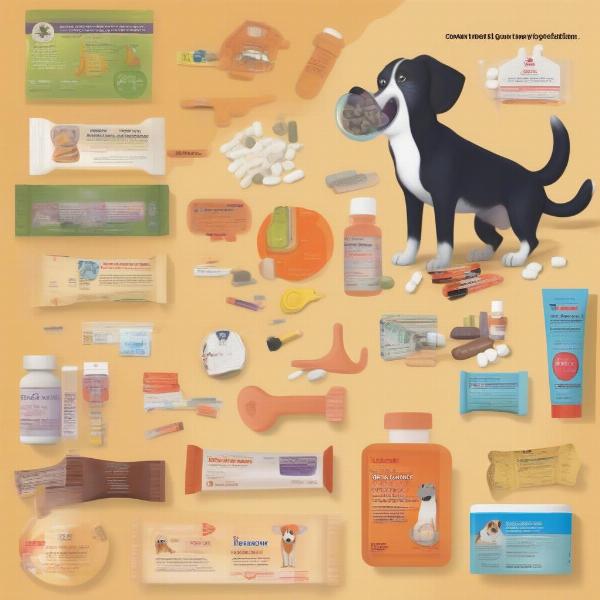Allwormer for dogs is a crucial part of responsible pet ownership. These medications protect our canine companions from a variety of internal parasites, ensuring they live long, healthy lives. This guide will delve into the importance of allwormers, different types available, how to administer them, and potential side effects. Choosing the right allwormer can feel overwhelming, so we’ll provide you with the information you need to make informed decisions for your furry friend.
Understanding the Need for Allwormers
Intestinal parasites, such as roundworms, tapeworms, hookworms, and whipworms, can cause a range of health problems in dogs, from mild digestive upset to severe illness. Puppies are particularly vulnerable, often inheriting worms from their mothers. Even adult dogs can become infected through contact with contaminated soil, feces, or prey. Regular deworming is essential to prevent these infections and safeguard your dog’s health.
 Types of Allwormers for Dogs
Types of Allwormers for Dogs
Types of Allwormers for Dogs
Several types of allwormers are available, each targeting different types of parasites. Some common options include:
- Broad-spectrum dewormers: These target a wide range of parasites and are often the preferred choice for routine deworming. Examples include products containing praziquantel, pyrantel pamoate, and febantel. drontal all wormer for dogs is a popular choice.
- Combination dewormers: These combine different active ingredients to target specific parasite combinations.
- Targeted dewormers: These are designed to treat specific types of worms, such as tapeworms or heartworms.
Your veterinarian can help you determine the best type of allwormer for your dog based on their age, lifestyle, and risk factors.
Administering Allwormers
Most allwormers are easy to administer, coming in palatable forms like chews or tablets. Some are even available as liquids that can be mixed with food. Always follow the dosage instructions provided by your veterinarian or on the product packaging. Accurate dosing is crucial for effectiveness and to avoid potential side effects.
“It’s important to remember that prevention is key,” says Dr. Emily Carter, DVM. “Regular deworming is a simple and effective way to protect your dog from the harmful effects of intestinal parasites.”
Potential Side Effects
While generally safe, allwormers can sometimes cause mild side effects such as vomiting, diarrhea, or loss of appetite. These are usually temporary and resolve on their own. However, if you notice any severe or persistent side effects, contact your veterinarian immediately.
Deworming Schedule for Dogs
The frequency of deworming depends on your dog’s age, lifestyle, and risk factors. Puppies should be dewormed every 2-3 weeks until they are 12 weeks old, followed by monthly treatments until they are six months old. Adult dogs should typically be dewormed every 3-6 months, though your veterinarian may recommend more frequent deworming depending on your dog’s individual needs. drontal allwormer dogs can be part of a regular deworming schedule.
Choosing the Right Allwormer
With so many allwormers available, it can be challenging to choose the right one for your dog. Factors to consider include your dog’s age, weight, breed, and lifestyle. Consult your veterinarian for personalized advice. They can recommend a suitable product and dosage based on your dog’s specific needs. paragard allwormer for dogs is another option worth discussing with your vet.
“Choosing the right allwormer is crucial for effectively protecting your dog,” advises Dr. David Lee, DVM. “A veterinarian can assess your dog’s individual needs and recommend the most appropriate product.”
Conclusion
Allwormers play a vital role in maintaining your dog’s health and well-being. By understanding the different types of allwormers, their administration, and potential side effects, you can make informed decisions to protect your furry companion from harmful intestinal parasites. Regular deworming, along with a healthy diet and lifestyle, will help ensure your dog lives a long and happy life. Remember to consult your veterinarian for personalized advice on the best allwormer for your dog. milbemax all wormer for dogs is also a good choice to consider.
FAQ
- How often should I deworm my dog? The frequency depends on your dog’s age, lifestyle, and risk factors. Consult your veterinarian for a personalized recommendation.
- What are the signs of worms in dogs? Signs can include vomiting, diarrhea, weight loss, a pot-bellied appearance, and scooting.
- Can I buy allwormers over the counter? Yes, but it’s always best to consult your veterinarian for the correct product and dosage.
- Are there any natural alternatives to allwormers? While some natural remedies exist, their effectiveness is not always scientifically proven. Consult your vet before using any alternative treatments.
- Can humans get worms from dogs? Yes, some dog worms can be transmitted to humans, so practicing good hygiene is essential.
- What should I do if my dog vomits after taking an allwormer? Contact your veterinarian for advice.
- Can I give my dog an allwormer if they are pregnant or nursing? Some allwormers are safe for pregnant or nursing dogs, but always consult your veterinarian first. paragard for dogs may be an option.
ILM Dog is a leading international pet website dedicated to providing expert advice on dog care and breeding. We offer comprehensive information on a range of topics, including breed selection, health and medical care, training, nutrition, grooming, and much more. With a focus on providing practical and reliable advice, we cater to dog owners of all experience levels from diverse cultural backgrounds. Contact us today for expert advice and support. Email: [email protected], Phone: +44 20-3965-8624. ILM Dog is your trusted source for all things dog-related.